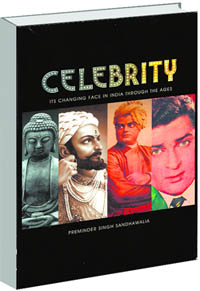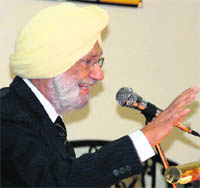The enduring appeal of our icons
Celebrity: Its Changing Face in India through the Ages
By Preminder Singh Sandhawalia
Authorhouse, London.
Pages 165. Rs 600
Reviewed by Roopinder Singh
 WHILE achievements are always celebrated, which accomplishments get accolades depends on the people of the time, the values that a particular culture holds dear at that moment, and a host of other factors. The author sets out to examine the changing perceptions of societies, through different eras, for celebrating achievements and thus fashioning their heroes.
WHILE achievements are always celebrated, which accomplishments get accolades depends on the people of the time, the values that a particular culture holds dear at that moment, and a host of other factors. The author sets out to examine the changing perceptions of societies, through different eras, for celebrating achievements and thus fashioning their heroes.
Socrates, on whose teachings much of western philosophy is based, challenged the existing order. In his time, he was branded a heretic and sentenced to death by the Athenian court. Today he is considered a towering intellectual hero. Sometimes the time between being put on a pedestal and being brought down is fairly short as Winston Churchill found out. The man who led Britain to triumph after the travails of World War II, lost the electoral battle soon thereafter.
Author of Noblemen and Kinsmen: History of a Sikh Family, and Beyond Identity, Sandhawalia introduces his concepts and gives a global context to his quest in the introduction. From there he goes on to focus on the Indian society, through a vast swath of history.
As he says, fame can be accidental but that cannot have a lasting effect. For that, fame has to be meritocratic, earned through enduring achievement which captures public imagination and for a person to gain an iconic status, his contribution must be truly be beyond outstanding, it must be epoch-making, era-defining, a product of vision, courage and exceptional expertise.
Yet, we must remember that it is people who define the celebrities of their time. It is the perception of what people regard as important that impacts the selection of who they regard as iconic. Spiritual leaders, kings and emperors, social reformers, freedom fighters, scientists, military leaders, all have the potential of being celebrities, if the society needs to celebrate their achievements at any particular time.
In India, during the epic era, it is scholarship and spirituality that was celebrated. We had sages like Vayasa, the fountainhead of spirituality in Indian antiquity.
Gautam Buddha was an original thinker who gave us the Middle Path between the extremes of asceticism and indulgence, a system of philosophical thought and a religion. Buddha, the prince-turned-ascetic was truly a genius, but that alone would not have given him the status of an icon.
 During the Maurya period, a time of intellectual ferment, it is not the great king Chandragupta Maurya who was the icon. Rather, that particular honour goes to his mentor, Chanakya, who grew up in Punjab and studied in Taxila. Arthashastra, his magnum opus, concerns itself with power, with no considerations of morality or altruism.
During the Maurya period, a time of intellectual ferment, it is not the great king Chandragupta Maurya who was the icon. Rather, that particular honour goes to his mentor, Chanakya, who grew up in Punjab and studied in Taxila. Arthashastra, his magnum opus, concerns itself with power, with no considerations of morality or altruism.
On the other hand, among the kings, it is Emperor Ashoka who stood the test of time. The emperor rejected the pure pursuit of power for Dhamma, piety, duty, good conduct, decency and purity.
In the Golden Age it was Aryabhatta who is credited with founding significant fundamental theories of mathematics and astronomy, as well as giving us the great scientific tract Aryabhatia in 499 AD, is iconic. Thereafter, it is Akbar who stands out. The Bhakti movement produced many divines, but none like Guru Nanak.
As we get nearer in time, we have Maharaja Ranjit Singh, Raja Rammohan Roy, Swami Vivekananda and the mathematical genius Ramanujan who stood out, as did Gandhi, Subhas Chandra Bose and Rabindranath Tagore.
In recent times, it is since the world has become more and more complicated, sometimes it is not people but organisations and institutions like ISRO and the Election Commission that get great accolades.
Along with that there are many celebrities, spiritual, performing artists, film stars, even political leaders, sports persons and even people who are famous for being famous. They all vie for the attention of the masses, yet it is too early to say who among them would become an icon.
Preminder Singh Sandhawalia died shortly after publishing this incisive account. His books, including this volume, will ensure that that he continues to live through his work.
